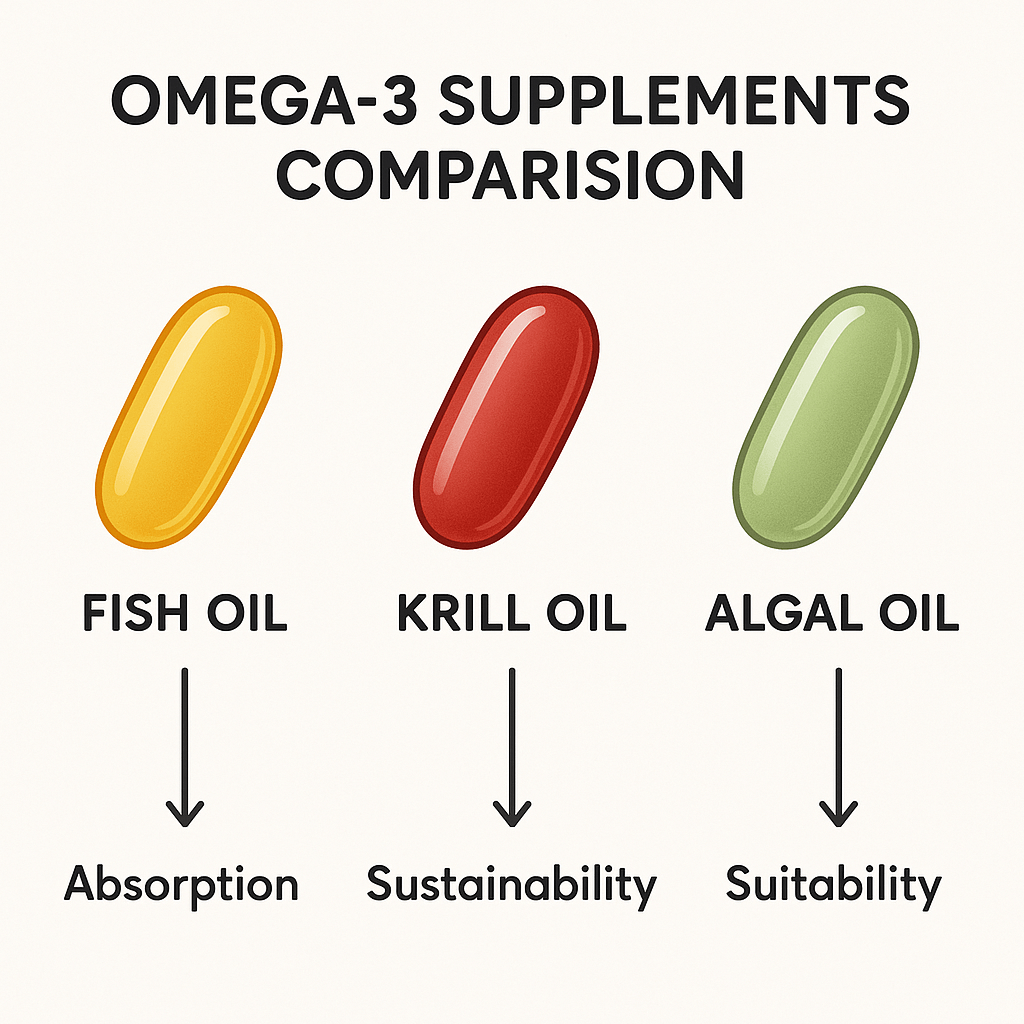Omega-3 fatty acids are essential nutrients that play a crucial role in supporting heart health, brain function, eye health, and reducing inflammation in the body. As our bodies cannot produce these fatty acids efficiently, many people turn to supplements to meet their daily needs. The three most popular omega-3 supplements are fish oil, krill oil, and algal oil. While all three provide the vital omega-3s EPA (eicosapentaenoic acid) and DHA (docosahexaenoic acid), they differ in their sources, absorption rates, sustainability, and suitability for various diets. Let’s take a closer look at each option to help you choose the best supplement for your lifestyle and health goals.
| Feature | Fish Oil | Krill Oil | Algal Oil |
|---|---|---|---|
| Source | Oily fish | Antarctic krill | Marine algae |
| EPA/DHA Form | Triglyceride/Ethyl ester | Triglyceride & Phospholipid | Triglyceride/Phospholipid |
| Absorption | Good | Possibly better | Good |
| Sustainability | Varies (look for certified) | Generally good, but monitor overharvesting | Excellent |
| Suitability | Omnivores | Omnivores | Vegans/Vegetarians |
| Contaminants | Possible (choose purified) | Low risk | None |
| Price | Moderate | Higher | Moderate to high |

Contents
Fish Oil: The Classic Choice
Fish oil has long been the go-to omega-3 supplement. It is typically sourced from oily fish such as sardines, mackerel, and anchovies. Fish oil supplements are available in liquid, softgel, and capsule forms, making them convenient for most people.
One of the main advantages of fish oil is its high concentration of EPA and DHA. These forms of omega-3 are readily used by the body and have been extensively studied for their health benefits. Fish oil is particularly effective at supporting cardiovascular health, lowering triglyceride levels, and reducing inflammation. Some research also suggests that fish oil may help with mood regulation and cognitive function.
However, fish oil has some drawbacks. The taste and smell can be off-putting for some, and it may cause fishy burps or aftertaste. Additionally, concerns about contaminants like mercury and PCBs exist, though reputable brands use purification processes to minimize these risks. When choosing a fish oil supplement, it’s important to look for products that are third-party tested for purity and potency.
Krill Oil: The Rising Star
Krill oil is extracted from tiny crustaceans called krill, which are found in the cold waters of the Antarctic. Unlike fish oil, the omega-3s in krill oil are bound to phospholipids, which may enhance their absorption and bioavailability in the body. This means you might need a lower dose of krill oil to achieve the same benefits as a higher dose of fish oil.
Krill oil also contains a powerful antioxidant called astaxanthin, which gives it a distinctive red color and may help protect the delicate omega-3s from oxidation. This added antioxidant boost is a unique benefit not found in most fish oil supplements.
In terms of sustainability, krill are abundant and reproduce quickly, making krill oil a more environmentally friendly option compared to some fish oil sources. However, as krill are a crucial part of the marine food chain, it’s important to choose krill oil from companies that use sustainable harvesting practices and are certified by organizations such as the Marine Stewardship Council.
Despite its benefits, krill oil tends to be more expensive than fish oil and is not suitable for individuals with shellfish allergies or those following a vegetarian or vegan diet.
Algal Oil: The Plant-Based Powerhouse
Algal oil is derived from marine algae, the original source of EPA and DHA in the ocean food chain. Fish and krill actually obtain their omega-3s by eating algae, so algal oil offers a direct, plant-based source of these essential nutrients.
Algal oil is the best omega-3 option for vegetarians, vegans, and those with fish or shellfish allergies. It provides both EPA and DHA and is available in capsules or liquid form. Algal oil is also free from the contaminants sometimes found in fish-based supplements, making it a clean and pure choice.
From an environmental perspective, algal oil is highly sustainable. Algae can be grown in controlled environments, using minimal land and water resources, and without impacting marine ecosystems. This makes algal oil a responsible choice for those concerned about overfishing and ocean health.
While algal oil supplements are generally more expensive than fish oil, the price has become more competitive as demand has increased and production methods have improved. Many people find that algal oil is gentle on the stomach and has little to no aftertaste, making it an appealing alternative.
Factors to Consider When Choosing an Omega-3 Supplement
When deciding which omega-3 supplement is right for you, consider the following factors:
- Dietary Preferences: If you’re vegetarian, vegan, or allergic to fish or shellfish, algal oil is your best bet.
- Absorption and Effectiveness: Krill oil may offer slightly better absorption due to its phospholipid content, but all three sources are effective at raising omega-3 levels in the body.
- Sustainability: Algal oil and certified-sustainable krill oil are the most environmentally friendly choices.
- Cost: Fish oil is generally the most affordable, while krill and algal oils are priced higher.
- Purity and Safety: Look for products that are third-party tested for heavy metals, PCBs, and other contaminants.
Making the Best Choice for Your Health
Ultimately, the best omega-3 supplement is the one that fits your personal needs, dietary restrictions, and values. Fish oil remains a popular and effective choice for many, but krill oil and algal oil offer unique advantages in terms of absorption, sustainability, and suitability for special diets. No matter which supplement you choose, always select a high-quality product from a reputable manufacturer and consult your healthcare provider if you have any questions or underlying health conditions.
Adding omega-3s to your daily routine can be a simple yet powerful way to support your overall health and well-being. With so many options available, you’re sure to find a supplement that works for you.
To further expand on the discussion of omega-3 supplements, it’s worth mentioning Ultra Omega Burn—a supplement that has gained attention for its unique formulation and potential health benefits. Unlike traditional omega-3 supplements that focus primarily on EPA and DHA, Ultra Omega Burn centers on omega-7 fatty acids, specifically palmitoleic acid.
This compound is promoted for its ability to enhance fat metabolism, support weight loss, and regulate appetite by helping the body release and burn stored fat, particularly in stubborn areas like the belly and thighs. In addition to its weight management claims, Ultra Omega Burn is also said to support heart health by improving cholesterol profiles, promote healthier skin by supporting cell regeneration, and aid digestive health by enhancing gut function.
The supplement is marketed as an all-natural product and includes a 365-day money-back guarantee, allowing users to try it with minimal risk. However, as with any supplement, it is important to consult a healthcare professional before starting Ultra Omega Burn, especially for those with underlying health conditions or who are taking other medications.
References
Here are 10 credible medical references for your omega-3 article with verified links:
- Dempsey M et al. (2023)
The influence of dietary and supplemental omega-3 fatty acids on cardiovascular health
https://www.ncbi.nlm.nih.gov/pmc/articles/PMC9892774/ - Grosso G et al. (2014)
Role of Omega-3 Fatty Acids in the Treatment of Depressive Disorders
https://journals.plos.org/plosone/article?id=10.1371/journal.pone.0096905 - Khan SU et al. (2021)
Effect of omega-3 fatty acids on cardiovascular outcomes
https://doi.org/10.1016/S2589-5370(21)00277-7 - Dinu M et al. (2024)
Effects of omega-3 fatty acids on coronary revascularization
https://doi.org/10.1093/eurjpc/zwae261 - Deng W et al. (2023)
Omega-3 supplementation for osteoarthritis patients
https://doi.org/10.1186/s13018-023-03855-w - Bischoff-Ferrari HA et al. (2025)
Omega-3 and vitamin D supplementation slows biological aging
https://www.medicalnewstoday.com/articles/daily-omega-3-supplements-and-regular-exercise-may-slow-aging - WebMD Editorial Team (2024)
Salmon Oil Health Benefits and Clinical Evidence
https://www.webmd.com/diet/salmon-oil-health-benefits - Chewcharat A et al. (2020)
Omega-3 effects on diabetic nephropathy
https://doi.org/10.1371/journal.pone.0228315 - Harris WS (2023)
Omega-3 Index as cardiovascular risk biomarker
https://doi.org/10.1038/s41420-023-01443-9 - Nicholls SJ et al. (2020)
STRENGTH Trial: EPA/DHA combination therapy outcomes
https://doi.org/10.1093/eurjpc/zwaa261
Dr. Emily Carter, MD
Dr. Emily Carter is a board-certified physician specializing in nutrition and preventive medicine. With over 12 years of experience in clinical practice, Dr. Carter is committed to helping people achieve optimal health through evidence-based dietary choices and lifestyle interventions. She earned her medical degree from King’s College London and completed her residency at St. Mary’s Hospital.
Dr. Carter has contributed to numerous medical journals and is recognized for her ability to translate complex scientific research into clear, actionable guidance for the public. She is passionate about patient education and believes in empowering individuals to make informed decisions about their health and wellness.
Outside of her medical work, Dr. Carter enjoys gardening, reading historical novels, and participating in local health outreach programs.

